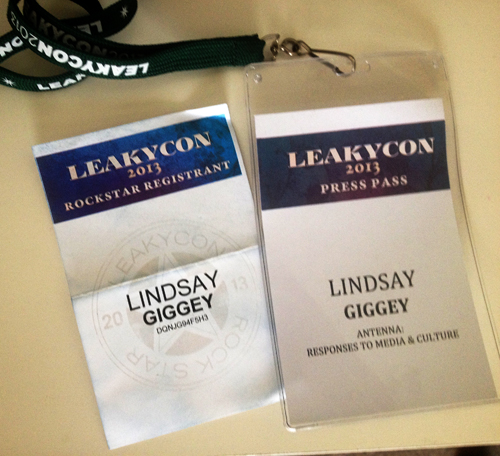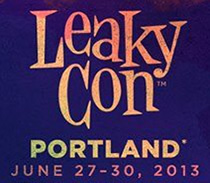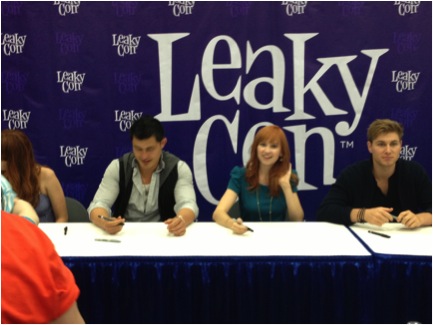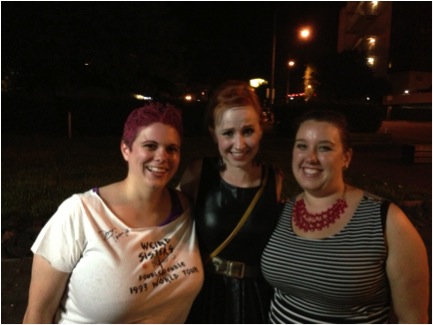On Wearing Two Badges: Indifference and Discomfort of a Scholar Fan (LeakyCon Portland)
This is the second of a seven-part series about the 4th LeakyCon convention held in Portland Oregon June 27-30, 2013. Part I and the rest of the series can be found here.
LeakyCon should have been a paradise for me. As a Ph.D student interested in industry/consumer relationships, the chance to attend a convention unified by Harry Potter(!) that celebrates reading, writing, creation, and general enthusiasm for nerdy girl culture seemed like the perfect place to explore my own fandom and experiment with fan ethnographies.
 Despite the anticipation leading up to Portland, I found myself, initially, surprisingly indifferent about the experience. As I attended panels and walked the exhibit room, I felt out of place. LeakyCon created a world within the Oregon Convention Center that constantly went out of its way to remind me that loving nerdy things was awesome, being nerdy was awesome, I was awesome, everyone around me was awesome, and we would all become lifelong friends for sharing this awesome experience. So why didn’t I feel awesome?
Despite the anticipation leading up to Portland, I found myself, initially, surprisingly indifferent about the experience. As I attended panels and walked the exhibit room, I felt out of place. LeakyCon created a world within the Oregon Convention Center that constantly went out of its way to remind me that loving nerdy things was awesome, being nerdy was awesome, I was awesome, everyone around me was awesome, and we would all become lifelong friends for sharing this awesome experience. So why didn’t I feel awesome?
As part of this project, I acquired a press badge in addition to my attendee one. In a space marked by collecting ribbons to exhibit one’s fan identities, I was marked as both a fan and an academic. At first, this seemed inconsequential. Wearing these two badges articulated my identity at LeakyCon as much as wearing Hogwarts robes expressed the identities of con attendees. Yet, I felt serious reservations about my place at LeakyCon because my academic interest and training made me an interloper and because I wasn’t a big enough fan. The burdens of both badges made me feel that I wore neither of them well. Through my unease, epistemological questions plagued me: As an academic, can one accurately describe fans, fandoms, and conventions without being a fan? As a fan, can one keep enough distance to provide an accurate assessment of other fans? Does that type of academic work constitute an act of fandom or tarnish the worlds that fans create with one another?
The first day of the con, for example, consisted of a series of “meet-ups”. In planning which of these to attend, I instinctively approached the schedule as a reporter, but methodological and ethical questions soon arose. Should I attend this con as a fan and try to experience it for myself? Or should I collect information as an ethnographer to understand the world around me? The easy solution seemed to be both. However, bridging the gap between academic and fan, participant and observer proved difficult. By not being a true participant, how could I fully understand and communicate the fan experience? Moreover, I felt guilty for intruding on spaces intended for people with genuine commonalities, concerned that I could negatively affect their con experiences.
With these insecurities in mind, I decided to shift gears and try the con as fan. However, I quickly felt inadequate. Although Harry Potter unifies LeakyCon, Rowling’s world also serves as a common space for creating more specific micro-communities based on other fandoms I did not share, such as Dr. Who, Sherlock, and the Starkids. Although my fannish love of Harry Potter and academic interests brought me to the conference, I was only really excited for the panels about my current obsession – The Lizzie Bennet Diaries (LBD).
In addition to not sharing most of these fandoms, I don’t share in many of the fan practices that would bring one to a convention in the first place. Although I am interested in community as an extension of individual fandom, it’s not something I seek out myself: I don’t know the acronyms, the references, or how to use Tumblr. My fan love is largely isolated and off-line. I don’t want fan-fictions that expand the world or to post gifs representing moments I love most. The world of the text itself is enough for me. However, it was not enough at LeakyCon. My lack of extratextual currency made me feel ambivalent about the experience and I disliked feeling distanced from those around me.
Frustrated with my indifference, I decided to do something I have never cared to do otherwise: I bought an LBD poster and got in the autograph line. Although this experience did not erase the divide completely removing my academic badge helped me enjoy more of the con as an attendee. I felt part of the community because I did something fans did and connected with my own fandom and friend community. However, my best experiences of the con are hard to document in academically worthwhile ways because they are far from academic; reconnecting with my childhood best friend who attended the con, chatting with Mary Kate Wiles (who plays Lyd-dee-ah in LBD), and the impromptu singing of the theme to The Fresh Prince of Bel Air along with half the cast of LBD, two Glee Warblers, and a Starkid on the train to the hotel.
These experiences led me to an epiphany. One of the most striking aspects of LeakyCon was how, by virtue of their youth, the attendees defined the space as one of identity exploration. I realized that I had that in common with them, because the con represented an important moment in my own becoming, as someone who is currently negotiating my new identity as a scholar-fan. In fact, struggling to bridge the gaps between the badges is what I have always done in my life. I’m the only academic in a blue-collar family, one of the few television students in my department, and the lone scholar at my industry internship.
Upon further reflection, the distance I felt from the conference theme of celebrating one’s “authentic” identity as a result of my position between these two worlds was not, in fact, inauthentic at all. I think I need to adjust my expectations and recognize that perhaps this discomfort in trying to resolve being a fan and academic doesn’t make me less of either. I hope that acknowledging this divide for what it is will, instead, make me a truer, dare I say more authentic researcher and fan, without compromising too much of what makes each of these identities so awesome.
For more on LeakyCon 2013, read:
– Part one (“Where the Fangirls Are“)
– Part three (“Fans and Stars and Starkids“)
– Part four (“From LGBT to GSM: Gender and Sexual Identity among LeakyCon’s Queer Youth“)
– Part five (“Inspiring Fans at LeakyCon Portland“)
– Part six (“Redefining the Performance of Masculinity“)
– Part seven (“Embracing Fan Creativity in Transmedia Storytelling“)





